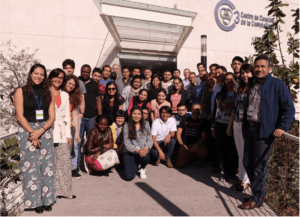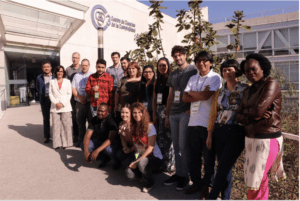
Course attendants, organisers and speakers at the entrance of the Centre of Complex Sciences (C3), UNAM.
To prepare regional scientists for the interdisciplinary Next Generation of Immunology, the IUIS EDU Committee, in collaboration with the Latin American Association of Immunology (ALAI) and the Mexican Society of Immunology (SMI), organised a course focused on informatics tools applied to Systems Immunology, a first in Latin America,. With representatives from 8 countries, the IUIS-ALAI-SMI Immunoinformatics Course was held on April 8th-10th, 2019, at the Center of Complexity Sciences of the National Autonomous University of Mexico, in Mexico City.
We shall share highlights of the first Latin-American Immuno-Informatics Course over the next series of articles. This course was attended with 36 participants and faculties from Africa and North & South America (see more information below)
Human Immunology is a complex system involving a growing number of subsystems, that include immune cell compartments and their products, microenvironmental cues, as well as pathogens and non-pathogen microorganisms, which together elicit specific responses: tolerance or protection. Sometimes, high complexity experiments should be performed to address topical aspects of immunology by controlling several variables. Systems immunology offers a large variety of tools to analyze and/or in silico model such experiments and their multiple variables to predict expected and unexpected results, as well to save time or money before experimentation.
At the Immunoinformatics Course, a general but scrupulous review of fundamental Immunology concepts and the current advances in the topical area of Immunoinformatics, comprising most computational applications to complex immunobiological systems, was completed under three session formats: Introductory, Hands-On-Practice and Applications. A module-organized online pre-course was provided and the intense discussion during poster sessions maximized student participation. This was followed by practical workshops, where participants learned data analyses and mathematical modeling strategies by using different software. The course aimed to provide the necessary information to be routinely used on basic and applied Immunology research from the complexity perspective.
Dr. Elena Álvarez-Buylla, current Head of the National Council of Science and Technology (CONACYT) in Mexico, delivered an introductory lecture about Systems Immunology, focused on cellular differentiation modeling by using Boolean models with multiple stable states that correlate to cell types or functions of interest. This network models are also useful for identifying minimal regulatory modules and simulate mutant phenotypes. Boolean model analysis is a general tool based on the search of stationary states of a system, also known as attractors. The models can be manually reconstructed by literature curation or by automatic curation of low and/or high throughput experiments. In concordance, Luis Mendoza showed how leukocyte differentiation can be modeled by a Boolean model based on a network conformed by lineage-specific transcriptional factors. Taking into account that Boolean formalism considers only 0 and 1 activation values for the elements of the models, Luis Mendoza presented a method to jump from Boolean models to continuous models by using differential equations. These two approaches can be applied to the simulation of in silico of single cell behaviors or as a collective behavior of a cell population through virtual cultures. To complement the talks on dynamic modeling, Mariana Martínez-Sánchez deepened the use of mathematics to establish logical and coherent predictions to analyze the emergence of complex properties of the immune systems. She made a special emphasis on the importance of mathematical models satisfying the characteristics of robustness and plasticity.
*More to come in the next article. 🙂

Travel Awardees -from Argentina, Honduras, Brazil, Benin, Kenya and Tunisia- with members of the Organinzing Committee from ALAI, IUIS Edu Committee and Immunopaedia.
**Thirty-six professionals, including post-graduate students, clinicians, research fellows and principal investigators from African (Benin, Kenya, Tunisia) and American IUIS Federations (Argentina, Brazil, Honduras, Mexico, and USA), who were interested or currently conducting research in disciplines related to Systems Immunology, were pre-selected according to their performance in two on-line introductory pre-courses with educational modules about basic immunology and informatics tools, and to the potential usefulness of the training. Faculty was formed by 15 invited speakers from Argentina, Brazil, Colombia, Mexico, United Kingdom and USA, who are prestigious researchers with proven expertise in the field.
To chair the conference, Professors Dietrich Kabelitz and Clive Gray, Chair and Vice-chair, respectively, and Dr. Rosana Pelayo, member, represented the IUIS Education Committee, while Past-President Leopoldo Santos Argumedo, President Rogelio Hernández Pando and Ambassador Jennifer Enciso, represented ALAI, SMI and Immunopaedia, respectively.
Article by Juan Carlos Balandrán & Jennifer Enciso











